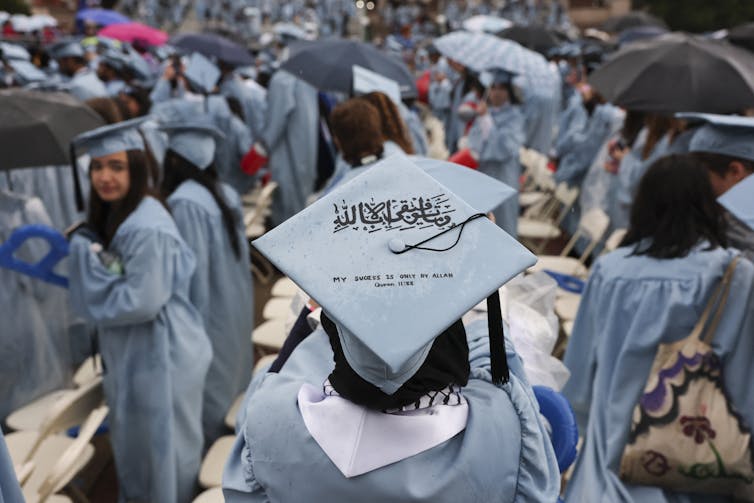
(The Conversation) — Universities, often perceived as bastions of progressive thought, are increasingly reflecting the broader political polarization gripping the nation.
Faculty members represent a university’s core identity and mission. They express the values of the institution in numerous ways, including teaching, mentoring, advising and researching.
In my research into the impact of college on student development and learning, I – and others – have found that faculty are the most important people influencing student learning, development, persistence and degree attainment.
However, no systematic efforts have ever been undertaken to find out how faculty’s work is influenced by their understanding of university life and religion – until now.
The Templeton Religion Trust, a charity focused on improving societal well-being through understanding individual well-being, funded a recent national survey my team and I administered to 1,000 faculty members. The survey asked faculty about their perceptions of university life, including free speech and diversity, equity and inclusion initiatives, often shortened to simply DEI.
The survey results reveal a striking divergence in perspectives on the often divisive issues of free speech and DEI among faculty. Those differences showed up particularly along the red state and blue state divide.
Yet, amid these deep disagreements, a surprising point of bipartisan consensus emerges: faculty members’ belief in the importance of religious, spiritual and secular inclusion in diversity efforts.

Faculty agreed on the importance of religious, spiritual and secular inclusion in diversity efforts. Here, a student graduating from Columbia University in New York on May 21, 2025, wears a graduation cap with a verse from the Quran written on it.
Jeenah Moon/POOL/AFP via Getty Images, CC BY
State political leaning is key
Survey responses represented national trends across various factors, including region, institutional control, institutional type and academic discipline.
In part of the analysis, we uncovered that the political leanings of a state – how a state voted in the presidential election of 2024 – play a significant role in what faculty perceive about free speech and DEI programming.
Even more compelling, significant differences reported by faculty from red versus blue states showed up consistently across gender, race, religion, academic discipline, faculty rank and whether the faculty member was employed at a private or public institution.
In other words, political leanings of a state were strongly associated with faculty perceptions regardless of these other factors.
Measuring the right to free speech
We asked faculty four questions related to their First Amendment rights, which we presented as: “The First Amendment protects freedom of speech, freedom of religion, freedom of the press, freedom of assembly, and freedom to petition.”
Working closely with experts in legal epidemiology, we asked faculty the extent to which they agreed with the following statements: a) the First Amendment is relevant to my job as a faculty member; b) the First Amendment is relevant to my research engagement; c) my institution provides me with my constitutionally mandated First Amendment rights; and d) I am aware of my rights and responsibilities as they relate to the First Amendment of the U.S. Constitution.
While awareness of First Amendment rights appears consistent across the board, a notable difference arises in faculty members’ perception of institutional protection of those rights.
Faculty in blue states are significantly more likely than those in red states to report that their institutions uphold their constitutionally mandated First Amendment rights. This implies a potential disconnect in how freedoms are experienced and protected, depending on the political leanings of the state where an institution is located.
Measuring attitudes about DEI
The divide deepens when it comes to DEI, defined in the survey as “campus diversity programs” in some instances and “diversity, equity, and inclusion” in others.
When compared with faculty in blue states, those in red states are far more inclined to view DEI efforts as “overreach,” agreeing with the statements that “diversity programs generally do more harm than good on college and university campuses” and “the promotion of diversity, equity, and inclusion on college and university campuses has gone too far.”
Conversely, blue state faculty largely disagree with these assertions. When compared with faculty in red states, those in blue states were more likely to agree that “campus diversity programs support student success,” demonstrating a stark ideological chasm on the value and impact of DEI.
This partisan disagreement extends to the very concept of banning DEI programs.
Red state faculty show moderate support for banning DEI, suggesting a belief that current efforts to curtail campus diversity initiatives are, according to survey response options, “well justified.”
Blue state faculty overwhelmingly support the continuation of these programs. They gave strong endorsement to the idea that “colleges and universities should continue to offer identity-specific organizations and programming.”
This schism reflects the ongoing national debate about the role and scope of DEI in higher education. Faculty perspectives mirror the political sentiments of their respective regions.
Amid this significant polarization, a crucial area of common ground emerges: what we call religious, spiritual and secular inclusion.
That’s the idea that DEI efforts should include programming and activities designed to help students from all religious, spiritual and secular backgrounds belong and succeed.
Religious, secular and spiritual diversity
Despite their sharp disagreements on other aspects of DEI, both red state and blue state faculty overwhelmingly agree that “colleges and universities should provide support for students of all religious, secular, and spiritual identities and backgrounds.”
And both groups similarly reject the notion that “campuses should not concern themselves with religious, secular and spiritual diversity.”
The findings from this survey highlight the complex landscape of faculty opinion in higher education. While significant difficulties remain in reconciling differing views on free speech and DEI, the shared commitment to religious, spiritual and secular inclusion offers a potential path to agreement.
By focusing on areas of consensus, institutions can begin to foster more inclusive environments to serve the needs of all students, regardless of their background or beliefs. Understanding these nuanced perspectives is the first step toward building more cohesive, pluralistic and intellectually vibrant academic communities across the nation’s varied political terrain.
(Matthew J. Mayhew, Professor of Higher Education, The Ohio State University. The views expressed in this commentary do not necessarily reflect those of Religion News Service.)
![]()
